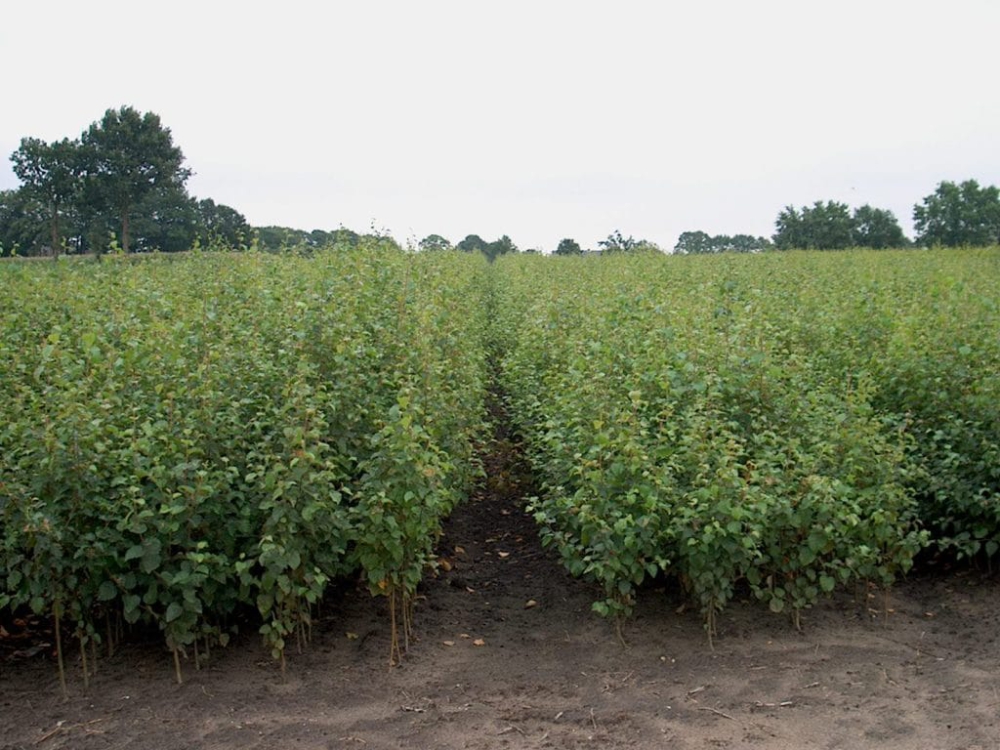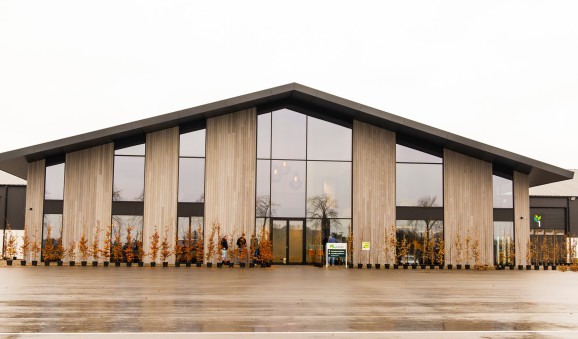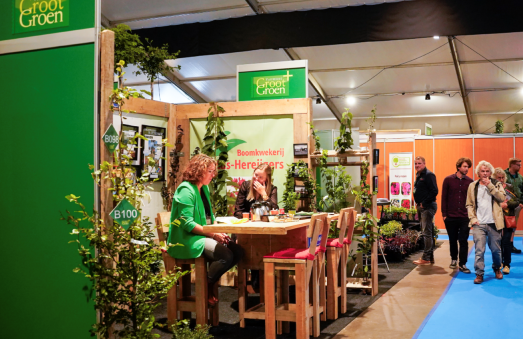WOODLAND AND HEDGE PLANTS: AN IMPORTANT PART OF THE DUTCH NURSERY STOCK INDUSTRY

Woodland and hedge plants in numbers
The area dedicated to woodland and hedge plants is currently 3053 Ha distributed among 508 companies (source: Agrimatie). Among companies considering the production of woodland and hedge plants as their main activity, there is a trend of expansion. This is partly due to strict environmental measures, which compel growers to leave a portion of their land fallow for crop rotation and/or to be planted with Tagetes as a soil conditioner. In the last decades of the previous century, the cultivation of woodland and hedge plants in open ground has been complemented by pot and container cultivation. Potted hedge plants are ideal for garden landscaping during periods when planting with bare roots is not feasible. For the establishment of landscape plantings, potted woodland plants can be a solution. Then there is the application of the so-called ready-made hedges, providing garden owners with an instant dense hedge.
Export
Almost 80% of Dutch woodland and hedge plant production is exported. This makes the industry highly dependent on economic developments and changing forestry practices in different countries. The industry tries to adapt to these changes, but it's not always easy. Roy Doomen, account manager at Accountantskantoor Van Oers, which releases an annual industryreport, noticed that the woodland and hedge plant industry was performing very well last spring. There is a slight decline in the fall, with the adverse weather playing a role. Certain varieties in the Zundert region are now moving a bit slower, particularly those produced in bulk. Cautious purchasing behaviour by authorities and the challenging German market are also contributing factors. This highlights that market-oriented cultivation, rather than acreage-focused growing, is becoming increasingly important.
The traditional market for woodland and hedge plants is forestry. The origin of the seed used is crucial in this regard. Buyers such as Staatsbosbeheer and German regional authorities often demand seed from a specific region because the growth conditions in that area closely resemble the region where they implement their forestry projects or landscape plantings. A growing number of buyers prefer plants cultivated with seed from the respective region, known as autochthonous material.
The cultivation of woodland and hedge plants in the Netherlands adheres to its own system of quality requirements, developed by the Cultuurgroep Bos- en Haagplantsoenkwekers. Woodland and hedge plants in private gardens For private gardens, somewhat wilder and more natural shrubs are ideal for creating a hedge or windbreak. Woodland plants quickly grow dense, which is convenient when establishing a hedge or windbreak. Adding ornamental shrubs provides more variety throughout the seasons. Moreover, it offers shelter and food for butterflies, birds, and mammals. Good-quality, potted, ready-made hedges are available in garden centres, but you can also choose the plants yourself. A hedge is an excellent way to create garden rooms, for use as a separation for the terrace, pool, or carport. It's also an attractive solution for hiding your waste containers from the view.
MPS introduces GreenerGrown
Growers who are pioneers in reducing their use of plant protection products want to distinguish themselves. This is now possible with the new MPS add-on: MPS-GreenerGrown. Growers increasingly more often face buyers who require sustainable products. Transparency in operations is already provided with the MPS-ABC certificate. Many buyers want to know which growers use the least plant protection products or even exclusively use biological plant protection products. MPS-GreenerGrown provides this insight.
Star system
MPS-GreenerGrown operates on a star system. Through this system, the grower gains insight into improvement opportunities and can work towards reducing the use of plant protection products and achieving a higher level. MPS-GreenerGrown is an add-on to MPS-ABC (business assurance) and MPS-ProductProof (product assurance). Through the registration of plant protection (within 48 hours) and independent sampling at the company level, a company demonstrates that growers use minimal amounts of chemical plant protection in cultivation. Based on this, a number of stars are awarded. MPS-GreenerGrown is also perfectly applicable in the cultivation of woodland and hedge plants.
NL PLants
Lodders Boomkwekerijen, a renowned company from Wernhout, opened the doors of its ultramodern trading company, NL Plants, in January. With this move, the company acquires a very prominent position in the essential nursery region. NL Plants has logically organized its facilities into different halls for supply, storage, and dispatch. Here, not only the products of the 100-hectare woodland and hedge plant nursery are traded, but also the plants, trees, and shrubs from dozens of suppliers and growers in the surrounding area.
Owner Marc Lodders emphasizes the importance of this collaboration: "These growers enable us to be flexible so that we can deliver quickly. This gives us a strong position. Customers don't always choose the lowest price, but reliability and speed."
Marc Lodders continues: "At our old location, we were actually reaching limits. Here, we have ample opportunities to build a sustainable future and take steps, including for our growers. Just keep going,or as I always say, Keep on Planting". ; Although this new location involved a journey full of challenges, the company now acquires a very prominent position in the nursery region of Zundert and its surroundings.
Boomkwekerij Dictus-Hereijgers
Another important player in woodland and hedge plants is Boomkwekerij Dictus-Hereijgers from Achtmaal, near Zundert. The total assortment of this company consists of approximately 50 species. The company supplies wholesalers, garden centres, landscapers, and fellow nurseries in the Netherlands and abroad. "Sustainable cultivation plays an important role in our business operations", says owner John Dictus. "Regarding water management, through water conservation (retaining water in the soil for as long as possible to combat dehydration and prevent drought damage), we have installed dams on multiple plots. We have also created a large pond for water storage to collect excess water or to irrigate in dry periods. Level-controlled drainage has been installed on various plots to be less dependent on climate conditions"
John continues::"Another contribution to the environment is mechanical hoeing between the rows,where weeds in the planting row are removed by a high-pressure airflow. Currently, three beds can be done simultaneously. This has resulted in an 80% reduction in weed control agents. We use plant strengtheners and compost tea to make the plants more resistant to diseases and pests, resulting in a 45% reduction in chemical agents." The latest development in the company is site-specific fertilization through task maps. This means that fertilizers are only applied where needed. This results in less runoff into surface water and less leaching into groundwater. John Dictus is satisfied with the current sales:" slightly less than last year, but we are certainly not complaining. And yes, theweather is not helping either. But with our assortment of over 50 species of woodland and hedge plants and winter cuttings, we can supply our customers well"

